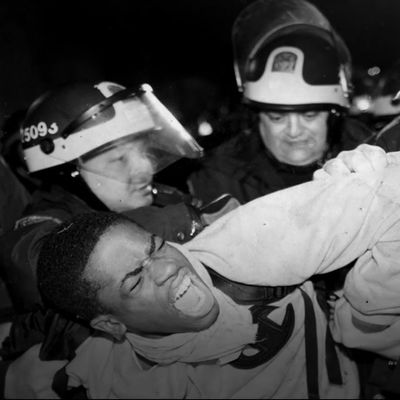
The New York Film Festival has opened for the first time in its 54-year history with a documentary, 13th, directed by Ava DuVernay, of Selma. What’s surprising is that it’s not a formally innovative work but a conventional talking-heads doc, made for Netflix. Why did the good people at the Film Society of Lincoln Center give it this prestigious platform? I imagine because this is an election year — the most potentially cataclysmic in our lifetime — and the programmers want the film to reach a moneyed, influential audience and the media attuned to its responses. But they’re also paying tribute to film’s scope. DuVernay has attempted to give mass incarceration (2.3 million people in the U.S., 40 percent of them black), Black Lives Matter, and white racism an economic context. “Law and order,” the film argues, is a code phrase for a form of slavery that exists right now, unrecognized.
The title refers to the constitutional amendment that freed the slaves — but left them to their own devices in a crushed economy and a predatory culture. The irony, DuVernay says, is that the culture promptly recast blacks as the predators, the threats to social order as well as the virtue of white women. She invokes D.W. Griffith’s 1919 The Birth of a Nation to far greater effect than Nate Parker in his shockingly crude new film of the same name. (I was surprised that Parker’s film wasn’t chosen for the NYFF — until I saw it.) The point we’re meant to take away is that one form of slavery was replaced by another. Prison labor isn’t covered by the 13th Amendment.
From the outset, black leaders were criminalized and have remained so, even after Lyndon Johnson signed the Voting Rights Act. (I still have a bone to pick with DuVernay about her vilification of LBJ in Selma, which was specious, opportunistic, and, more important, unworthy of her.) J. Edgar Hoover brought the full force of his “bureau” on some of the most visionary civil-rights activists of our time. Fred Hampton was shot to death in his bed, though Angela Davis somehow escaped being killed or imprisoned and is interviewed (to great effect) in the film. Top Nixon aide and Watergate felon John Ehrlichman is quoted on the purposeful demonization of anti-war activists and the drug culture.
I have my issues with some of DuVernay’s subjects, who argue that crack, an “inner city” drug, was treated more harshly than cocaine, a suburban white drug. Maybe, but crack was and has been proven to be more addictive and more dangerous, and the crime in its wake wasn’t, uh, trumped-up. You’d think from 13th that crime didn’t exist. There’s no attempt to find a middle ground between the hyperbolic “super-predators” — a term we see then-First Lady Hillary Clinton throwing around — and genuine predators. (Yes, I am the stereotypical liberal who has been mugged — twice, once with a degree of force. It did not turn me into a reactionary, but I bridle when I hear that urban crime in the ‘80s was largely the creation of the media.) Nor does DuVernay mention that even as five innocent black men were arrested and convicted for the brutal sexual assault on a Central Park jogger, one black newspaper took to calling the victim, “the Central Park hussy.” It was insane time and we were all confused and scared — white and black.
But in the main 13th makes connections that haven’t been made in a mainstream documentary before. Republican strategists like Lee Atwater used Willie Horton not just to get George H.W. Bush elected over Mike Dukakis but to set in motion the unprecedented construction of prisons, some for-profit, all of which needed to be filled. Bill Clinton’s omnibus crime bill and three-strikes law made the situation even worse for blacks, and DuVernay throws a spotlight on the big-business-funded ALEC — the American Legislative Exchange Council — which turns out to be the author of many of the laws that have helped pack for-profit private prisons (which use virtual slave labor). The movie argues that this mindset — and a militarized police force — has made beatings and murders of prisoners epidemic. Lincoln Center moviegoers who wish to pay tribute to one of ALEC’s biggest allies — Koch Industries — can stroll across the plaza and wave at the David H. Koch Theater.
13th has its mannerisms. No one interviewed looks at the camera, which is almost always arcing around him or her. The movie is frankly exhausting, with too much information (and too many brilliant interviewees) to do justice to here. You simply need to see it. Even in its overreaching, it’s vital. And your jaw will drop as Donald Trump waxes about the good old days when protesters were carried out of rallies in a stretcher — and we see images of those good old days that prove they weren’t so good for blacks.
As for the rest of the festival, well: I’m still working through it. Among its treasures is Barry Jenkins’s Moonlight, a quasi-romance (emphasis on quasi, but with lingering romanticism) that hype would bruise: It’s so sensitive in its touch that the usual superlatives sound unusually crass. Kenneth Lonergan’s Manchester by the Sea is among the bleakest films I’ve seen in years, although every drop of its despair is earned. There will be much to say about the refugee documentary Fire at Sea, Paul Verhoeven’s provocative (to say the least) S&M drama, Elle, and so much more. This could well be the most provocative NYFF in years.


